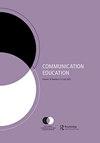学生对数字分心预防的看法和师生关系
IF 0.9
Q3 COMMUNICATION
引用次数: 2
摘要
摘要本研究调查了旨在遏制课堂数字化分心的课程政策和实施策略如何影响本科生对师生关系的感知。从美国四所大学本科生完成的在线调查中收集的数据显示,学生对融洽关系的看法可能会受到数字分心预防的影响。与会者赞同学生和教师合作制定的课程技术政策,这些政策旨在遏制数字设备用于社交而非教育目的。研究结果表明,这些政策可以提高学生的认同感,改善学生对融洽关系的看法。尽管参与者认为,在违反政策的情况下,对抗性的执法策略(如叫学生出来、降低成绩、没收电话)对于减少课堂上的数字干扰最为有效,但这些策略也被认为对他们与教师的融洽关系最为有害。尽管在课堂上经常将设备用于非任务目的,但大多数参与者并不担心被抓住,因为他们认为他们的导师并不特别担心课堂上持续的数字干扰。通过自决理论的视角,提出了解决学生数字分心问题,同时保护师生关系质量的建议。本文章由计算机程序翻译,如有差异,请以英文原文为准。
Student perceptions of digital distraction prevention and student–instructor rapport
ABSTRACT The present study investigated how course policies and enforcement strategies designed to curb classroom digital distraction affect undergraduates' perceptions of student-instructor rapport. Data gathered from online surveys completed by undergraduates at four United States universities revealed that student perceptions of rapport can be influenced by digital distraction prevention. Participants endorsed course technology policies that are developed in collaboration between students and instructors and that are targeted at curbing the use of digital devices for social, rather than educational, purposes. Findings indicate that such policies can improve student buy-in and improve student perceptions of rapport. Although participants identified confrontational enforcement strategies (e.g., calling students out, grade reductions, phone confiscation) as most effective for reducing the amount of digital distraction during class when policies are violated, these strategies were also identified as being most harmful to their perceptions of rapport with instructors. Despite regularly using devices for off-task purposes during class, most participants are not worried about getting caught because they do not believe their instructors are particularly concerned about the amount of ongoing digital distraction in the classroom. Recommendations for addressing student digital distraction while protecting the quality of student-instructor rapport are provided through the lens of self-determination theory.
求助全文
通过发布文献求助,成功后即可免费获取论文全文。
去求助
来源期刊

COMMUNICATION EDUCATION
EDUCATION & EDUCATIONAL RESEARCH-
CiteScore
3.10
自引率
34.80%
发文量
47
期刊介绍:
Communication Education is a peer-reviewed publication of the National Communication Association. Communication Education publishes original scholarship that advances understanding of the role of communication in the teaching and learning process in diverse spaces, structures, and interactions, within and outside of academia. Communication Education welcomes scholarship from diverse perspectives and methodologies, including quantitative, qualitative, and critical/textual approaches. All submissions must be methodologically rigorous and theoretically grounded and geared toward advancing knowledge production in communication, teaching, and learning. Scholarship in Communication Education addresses the intersections of communication, teaching, and learning related to topics and contexts that include but are not limited to: • student/teacher relationships • student/teacher characteristics • student/teacher identity construction • student learning outcomes • student engagement • diversity, inclusion, and difference • social justice • instructional technology/social media • the basic communication course • service learning • communication across the curriculum • communication instruction in business and the professions • communication instruction in civic arenas In addition to articles, the journal will publish occasional scholarly exchanges on topics related to communication, teaching, and learning, such as: • Analytic review articles: agenda-setting pieces including examinations of key questions about the field • Forum essays: themed pieces for dialogue or debate on current communication, teaching, and learning issues
 求助内容:
求助内容: 应助结果提醒方式:
应助结果提醒方式:


